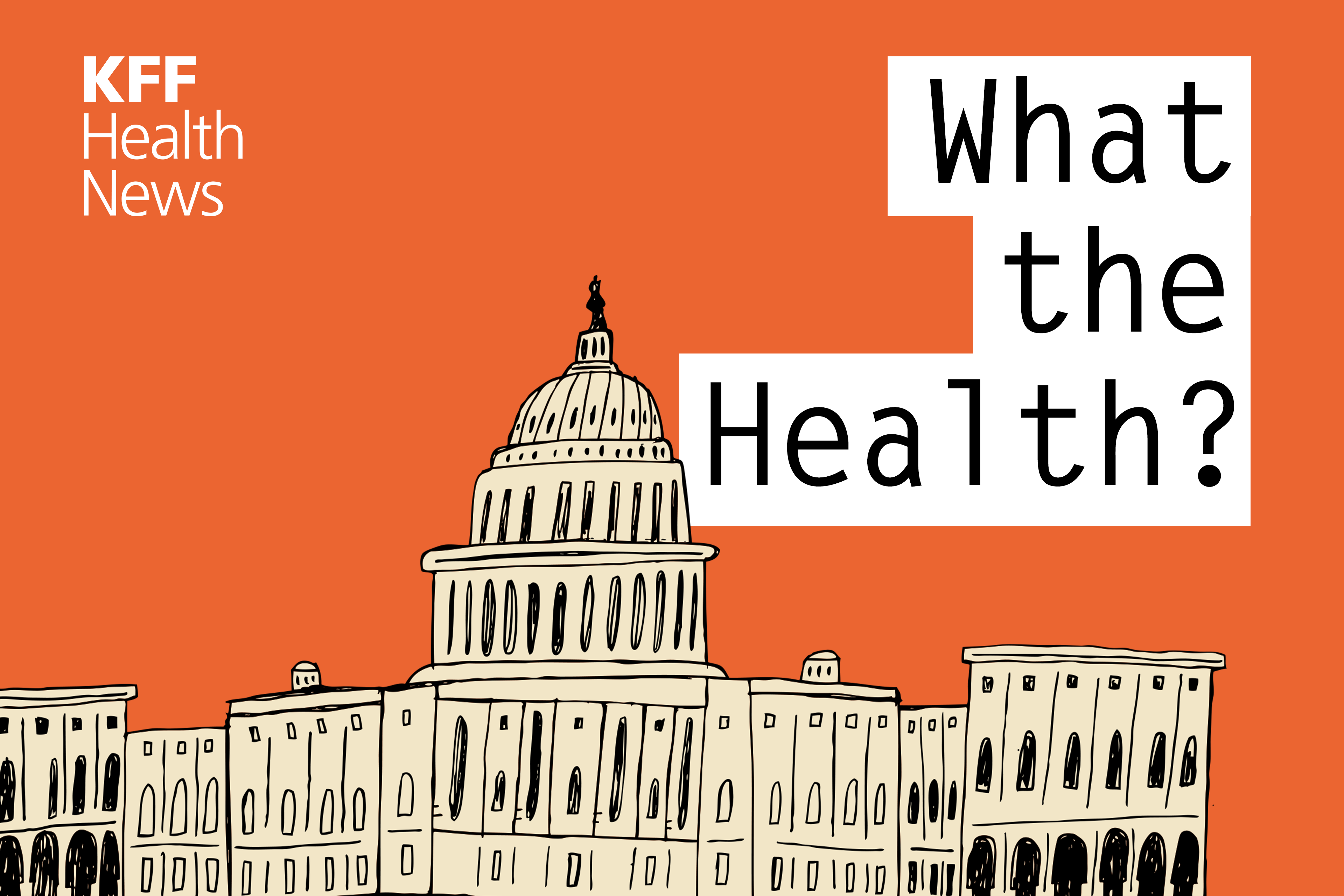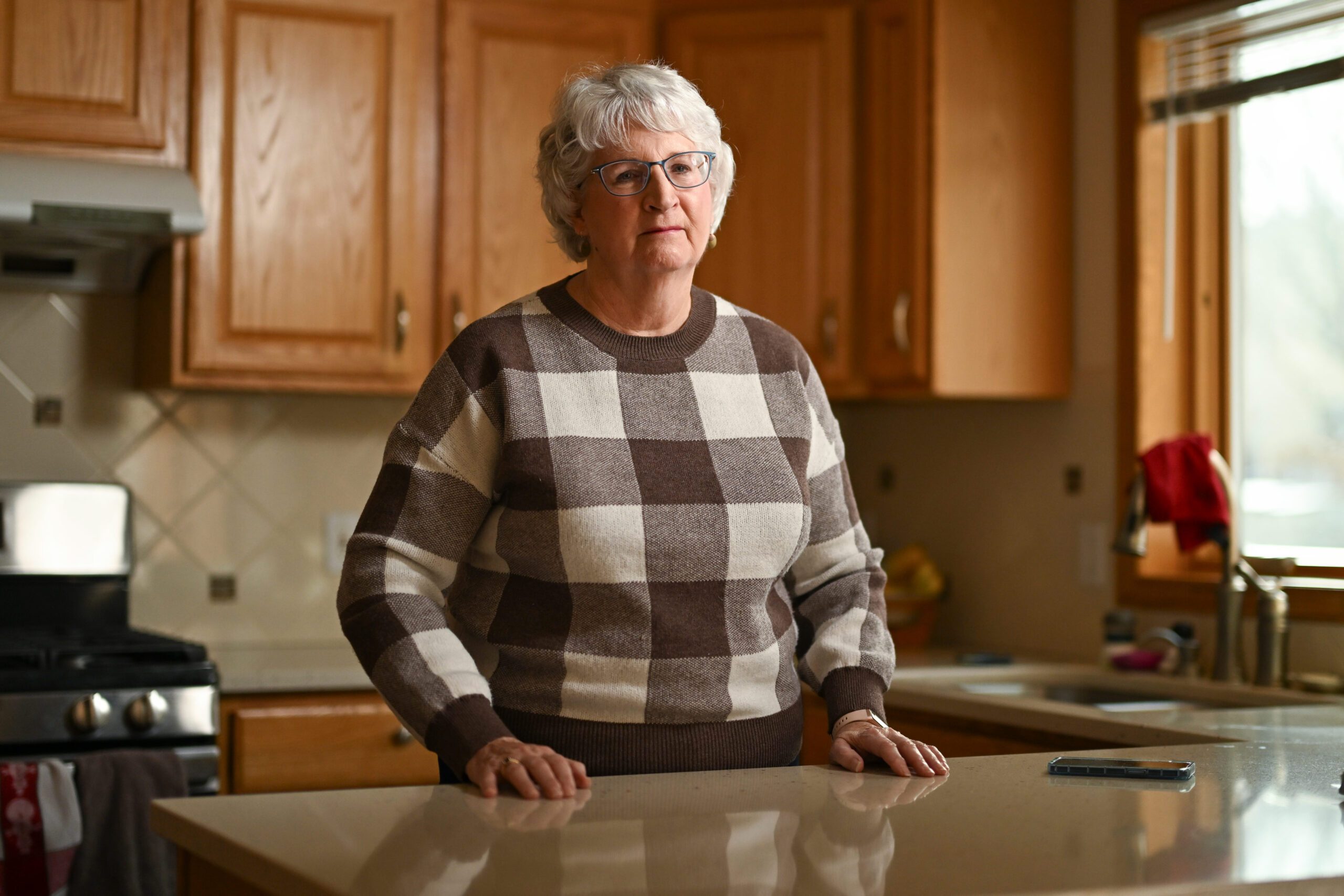
The Host
Julie Rovner KFF Health News @jrovner @julierovner.bsky.social Read Julie's stories. Julie Rovner is chief Washington correspondent and host of KFF Health News’ weekly health policy news podcast, “What the Health?” A noted expert on health policy issues, Julie is the author of the critically praised reference book “Health Care Politics and Policy A to Z,” now in its third edition.With only a single vote to spare, the House passed a controversial budget bill that includes billions of dollars in tax cuts for the wealthy, along with billions of dollars of cuts to Medicaid, the Affordable Care Act, and the food stamp program — most of which will affect those at the lower end of the income scale. But the bill faces an uncertain future in the Senate.
Meanwhile, Health and Human Services Secretary Robert F. Kennedy Jr. released a report from his commission to “Make America Healthy Again” that described threats to the health of the American public — but notably included nothing on threats from tobacco, gun violence, or a lack of health insurance.
This week’s panelists are Julie Rovner of KFF Health News, Anna Edney of Bloomberg News, Sarah Karlin-Smith of the Pink Sheet, and Alice Miranda Ollstein of Politico.
Panelists
Anna Edney Bloomberg News @annaedney @annaedney.bsky.social Read Anna's stories. Sarah Karlin-Smith Pink Sheet @SarahKarlin @sarahkarlin-smith.bsky.social Read Sarah's stories. Alice Miranda Ollstein Politico @AliceOllstein @alicemiranda.bsky.social Read Alice's stories.Among the takeaways from this week’s episode:
- House Republicans passed their “big, beautiful” bill 215-214 this week, with one Republican critic voting present. But the Senate may have its own “big, beautiful” rewrite. Some conservative senators who worry about federal debt are concerned that the bill is not fully paid for and would add to the budget deficit. Others, including some red-state Republicans, say the bill’s cuts to Medicaid and food assistance go too far and would hurt low-income Americans. The bill’s cuts would represent the biggest reductions to Medicaid in the program’s 60-year history.
- Many of the bill’s Medicaid cuts would come from adding work requirements. Most people receiving Medicaid already work, but such requirements in Arkansas and Georgia showed that people often lose coverage under these rules because they have trouble documenting their work hours, including because of technological problems. The nonpartisan Congressional Budget Office estimated an earlier version of the bill would reduce the number of people with Medicaid by at least 8.6 million over a decade. The requirements also could add a burden for employers. The bill’s work requirements are relatively broad and would affect people who are 19 to 64 years old.
- People whose Medicaid coverage is canceled also would no longer qualify for ACA subsidies for marketplace plans. Medicare also would be affected, because the bill would be expected to trigger an across-the-board sequestration cut.
- The bill also would impact abortion by effectively banning it in ACA marketplace plans, which would disrupt a compromise struck in the 2010 law. And the bill would block funding for Planned Parenthood in Medicaid, although that federal money is used for other care such as cancer screenings, not abortions. In the past, the Senate parliamentarian has said that kind of provision is not allowed under budget rules, but some Republicans want to take the unusual step of overruling the parliamentarian.
- This week, FDA leaders released covid-19 vaccine recommendations in a medical journal. They plan to limit future access to the vaccines to people 65 and older and others who are at high risk of serious illness if infected, and they want to require manufacturers to do further clinical trials to show whether the vaccines benefit healthy younger people. There are questions about whether this is legal, which products would be affected, when this would take effect, and whether it’s ethical to require these studies.
- HHS released a report on chronic disease starting in childhood. The report doesn’t include many new findings but is noteworthy in part because of what it doesn’t discuss — gun violence, the leading cause of death for children and teens in the United States; tobacco; the lack of health insurance coverage; and socioeconomic factors that affect access to healthy food.
Also this week, Rovner interviews University of California-Davis School of Law professor and abortion historian Mary Ziegler about her new book on the past and future of the “personhood” movement aimed at granting legal rights to fetuses and embryos.
Plus, for “extra credit,” the panelists suggest health policy stories they read this week they think you should read, too:
Julie Rovner: The Washington Post’s “White House Officials Wanted To Put Federal Workers ‘in Trauma.’ It’s Working,” by William Wan and Hannah Natanson.
Alice Miranda Ollstein: NPR’s “Diseases Are Spreading. The CDC Isn’t Warning the Public Like It Was Months Ago,” by Chiara Eisner.
Anna Edney: Bloomberg News’ “The Potential Cancer, Health Risks Lurking in One Popular OTC Drug,” by Anna Edney.
Sarah Karlin-Smith: The Farmingdale Observer’s “Scientists Have Been Studying Remote Work for Four Years and Have Reached a Very Clear Conclusion: ‘Working From Home Makes Us Happier,’” by Bob Rubila.
Also mentioned in this week’s podcast:
click to open the transcript Transcript: Bill With Billions in Health Program Cuts Passes House[Editor’s note: This transcript was generated using both transcription software and a human’s light touch. It has been edited for style and clarity.]
Julie Rovner: Hello, and welcome back to “What the Health?” I’m Julie Rovner, chief Washington correspondent for KFF Health News, and I’m joined by some of the best and smartest health reporters in Washington. We’re taping this week on Friday, May 23, at 10 a.m. As always, and particularly this week, news happens fast and things might have changed by the time you hear this. So, here we go.
Today we are joined via videoconference by Alice Miranda Ollstein of Politico.
Alice Miranda Ollstein: Hello.
Rovner: Anna Edney of Bloomberg News.
Anna Edney: Hi, everybody.
Rovner: And Sarah Karlin-Smith of the Pink Sheet.
Sarah Karlin-Smith: Hello there.
Rovner: Later in this episode we’ll have my interview with law professor and abortion historian Mary Ziegler, who has a new book out on the history and possible future of the “personhood” movement. But first, this week’s news.
So, against all odds and many predictions, including my own, the House around 7 a.m. Thursday morning, after being in session all night, passed President [Donald] Trump’s One Big Beautiful Bill — that is its actual, official name — by a vote of 215-214, with one Republican voting present. Before we get into the details of the House-passed bill, what are the prospects for this budget reconciliation bill in this form in the Senate? Very different, I would think.
Ollstein: Yeah, this is not going to come out the way it went in. Senate is already openly talking about a “‘One, Big Beautiful’ Rewrite” — that was the headline at Politico.
And you’re going to see some of the same dynamics. You’re going to see hard-liners saying this doesn’t go far enough, this actually adds a lot to the deficit even with all of the deep cuts to government programs. And you’re going to have moderates who have a lot of people in their state who depend on Medicaid and other programs that are set to be cut who say this goes too far. And so you’re going to have that same push and pull. And the House, barely, by one vote, got this through. And so we’ll see if the Senate is able to do the same.
Rovner: Yeah, so all eyes on [Sen.] John McCain in 2017. This year it could be all eyes on Josh Hawley, I suspect, the very conservative senator from Missouri who keeps saying “Don’t touch Medicaid.”
But back to the House bill. We don’t have official scores yet from the Congressional Budget Office, and we won’t for a while, I suspect. But given some last-minute changes made to pacify conservatives who, as Alice pointed out, said this bill didn’t cut deeply enough, I think it’s clear that if it became law in this form, it would represent the biggest cuts to federal health programs in the 60-year history of Medicare and Medicaid.
Those last-minute changes also took pretty square aim at the Affordable Care Act, too, so much that I think it’s safe to call this even more than a partial repeal of the health law. And Medicare does not go unscathed in this measure, either, despite repeated promises by President Trump on the campaign trail and since he took office.
Let’s take these one at a time, starting with Medicaid. I would note that at a meeting with House Republicans on Tuesday, President Trump told them not to expletive around with Medicaid. You can go look up the exact quote yourself if you like. But apparently he’s OK with the $700 billion plus that would be cut in the bill, which Republicans say is just waste, fraud, and abuse. Where does that money come from? And would Medicaid really continue to cover everyone who’s eligible now, which is kind of what the president and moderate Republicans are promising?
Edney: Well, it sounds like the bulk of it is coming from the work requirements that Alice mentioned earlier. And would it be able to cover them? Sure, but will it? No, in the sense that, as Alice has talked about often on this podcast, it’s basically a time tax. It’s not easy to comply with. All federal regulations, they’re not going to a website and putting in what you did for work. Particularly, if you are a freelancer or something, it can be really difficult to meet all the requirements that they’re looking for. And also, for some people, they just don’t have the ability, even the internet, to be able to do that reliably. So they’re going to save money because people are going to lose their health care.
Rovner: I saw a lot of people referring to them this week not as work requirements anymore but as work reporting requirements. Somebody suggested it was like the equivalent of having to file your income taxes every month. It’s not just check a box and say, I worked this month. It’s producing documentation. And a lot of people have jobs that are inconsistent. They may work some hours some week and other hours the other week. And even people who work for small businesses, that would put an enormous burden on the employers to come up with all this.
Obviously, the CBO thinks that a lot of people won’t be able to do this and therefore people are going to lose their health insurance. But Alice, as you have told us numerous times when we did this in Arkansas, it’s not that people aren’t working — it’s that people aren’t successfully reporting their work.
Ollstein: Right. And we’ve seen this in Georgia, too, where this has been implemented, where there are many different ways that people who are working lose their insurance with this. People who don’t have good internet access struggle. People who have fluctuating work schedules, whether it’s agricultural work, tourism work, things that are more seasonal, they can’t comply with this strict monthly requirement.
So there are numerous reports from the ground of people who should be eligible losing their coverage. And I’ll note that one of the last-minute changes the House made was moving up the start date of the requirements. And I’m hearing a lot of state officials and advocates warn that that gives states less time to set up a system where people won’t fall through the cracks. And so the predicted larger savings is in part because they imagine more people will be kicked off the program.
Rovner: It’s also the most stringent work requirement we’ve seen. It would cover people from age 19 through age 64, like right up until you’re eligible for Medicare. And if you lose Medicaid because you fail to meet these reporting requirements, you’re no longer eligible for a subsidy to buy insurance in the ACA exchange. Is there a policy point to this? Or are they just trying to get the most people off the program so they can get the most savings?
Edney: If you ask Republicans, they would tell you: We’re going to get people back working. We’re going to give them the pride of working — as if people don’t want that on their own. But the actual outcome is not that people end up working more. And there are cases even where they lose their health insurance and can’t work a job they already had. On the surface, and this is why it’s such a popular program, because it seems like it would get more people working. Even a large swath of Democrats support the idea when they just hear the name — of voters. But the actual outcome, that doesn’t happen. People aren’t in Medicaid because they aren’t working.
Rovner: Right. And I get to say for the millionth time, nobody is sitting on their couch living on their Medicaid coverage.
Edney: Right, right.
Rovner: There’s no money that comes with Medicaid. It’s just health insurance. The health providers get paid for Medicaid and occasionally the managed-care companies. But there’s no check to the beneficiary, so there’s no way to live on your Medicaid.
As Alice points out, most of the people who are working and have Medicaid are working at jobs, obviously, that don’t offer employer health insurance. So having, in many cases, as you say, Anna, having Medicaid is what enables you to work.
All right, well, our podcast pals Margot Sanger-Katz and Sarah Kliff have an excellent Medicaid story out this week on a new study that looks very broadly at Medicaid and finds that it actually does improve the health of its beneficiaries. Now this seems logical, but that has been quite a talking point for Republicans for many years, that we spend all this money and it doesn’t produce better health, because we’ve had a lot of studies that have been kind of neither here nor there on this.
Do we finally have proof that Democrats need? Because I have heard, over many years — there was a big Oregon study in 2011 that found that it helped people financially and that it helped their mental health, but there was not a lot of physical health benefit that they saw. Of course, it was a brief. It was like two years. And it takes a longer time to figure out the importance of health insurance. But I’m wondering if maybe the Democrats will finally be able to put down that talking point. I didn’t hear it, actually, as much this week as I have in years past: Why are we spending all this money on Medicaid when we don’t know whether it’s producing better health?
Karlin-Smith: One of the interesting things I thought about this study and sort of the timing of it, post-Obamacare expansion of Medicaid and more younger people being covered, is that it seems to really show that, not only does this study show it saves lives, but it’s really helping these younger populations.
And I think there are some theories as to why it might have been harder to show the economic cost-effectiveness benefits people were looking for before, when you had Medicaid covering populations that were already either severely ill or older. Which doesn’t mean it’s not valuable, right? To provide health coverage to somebody who’s 75 or 80, but unfortunately we have not found the everlasting secret to life yet.
So, but I think for economists who want to be able to show this sort of, as they show in this paper, this “quality-adjusted life year” benefit, this provides some really good evidence of what that expansion of Medicaid — which is a lot of what’s being rolled back, potentially, under the reconciliation process — did, which is, helps younger people be healthier and thus, right, hopefully, ideally, live a higher quality of life, and where you need less health coverage over time, and cost the government less.
It’s quite interesting, for people who want to go look at the graph The New York Times put in their story, of just where Medicaid fits, in terms of other sort of interventions we spend a lot of money on to help save lives. Because I was kind of surprised, given how much health insurance does cover, that it comes out on sort of the lower end, as being a pretty good bargain.
Rovner: Yeah. Well, we don’t have time to get into everything that’s in this bill, and there is a lot. It also includes a full ban of Medicaid coverage for gender-affirming care for both minors and adults. And it cuts reimbursement to states that use their own funds to provide coverage to undocumented people. Is this a twofer for Republicans, saving money while fighting the culture wars?
Edney: Certainly. And I was surprised to see some very liberal states on the immigration front saying: We just have to deal with this. And this really sucks, but we have to balance our budget. And if we’re not going to get those tax dollars, then we aren’t going to be able to offer health insurance to people who are undocumented, or Medicaid to people who are undocumented.
Rovner: Yeah, California, most notably.
Edney: Yeah, California for sure. And they found a way to do it, hit them in the pocketbook, and that that’s a way for them to win the culture war, for sure.
Rovner: Alice, you’ve spent a lot of time looking at gender-affirming care. Were you surprised to see it banned for adults, too? Obviously the gender-affirming care for minors has been a continuing issue for a while.
Ollstein: Yeah, I would say not surprised, because this is sort of a common pattern that we see across different things, including in the abortion space, where first policies are targeted just at minors. That often is more politically palatable. And then it gets expanded to the general population. And so I think, given the wave of state bans on care for minors that we’ve seen, I think a lot of people had been projecting that this was the trajectory.
I think that there’s been some really good reporting from The 19th and other outlets about what an impact this would have. Trans people are disproportionately low-income and dependent on Medicaid, and so this would have really sweeping impacts on a lot of people.
Rovner: Well, turning to the Affordable Care Act, if you thought Republicans weren’t going to try to repeal the health law this time around, you thought wrong. There are a bucket of provisions in this bill that will make the Affordable Care Act coverage both more expensive and harder to get, so much that some analysts think it could reduce enrollment by as much as half of the 24 million people who have it now. Hasn’t someone told Republicans that many of these people are their voters?
Edney: Yeah, that’s a good question. I don’t know what the Republican strategists are telling them. But certainly they needed to save money. And so they found their loopholes and their different things that they thought they could scrape from. And maybe no one will notice? But I don’t think that’s going to happen.
A lot of people suddenly have much higher ACA premiums because of the way they’re going to take away this ability that the insurers have had to silver-load, essentially, the way that they deal with the premium tax credits by setting some of the savings, kind of the cost sharing that they need to do, right into the silver plan, because the silver plan is where the premiums are set off of. And so they were able to offer the plans with lower premiums, essentially, but still get paid for cost-sharing reductions. So they were able to still get that money taken away from them.
Rovner: So let me see if I can do it. It was, and this was something that Trump tried to do in 2017, that he thought was going to hurt the marketplace plans. And it ended up doing the opposite—
Edney: Right.
Rovner: —because it basically shifted money from the insurance companies and the beneficiaries back to the federal government, because it made the premium subsidies bigger.
So I think the point I want to make is that we’ve been talking all year about these extra subsidies that are going to expire, and that will make premiums go up, and the Republicans did not move to extend those subsidies. But this going back to the government paying these cost-sharing reduction payments is going to basically reverse the accidental lowering of premiums that Trump did in 2017. And therefore, raise them again.
So now we have a double whammy. We have premiums going up because the extra subsidies expire, and then we’ll have premiums going up even more because they’re going back to this original cost-sharing reduction. And yet, as we have said many times, a lot of these additional people who are now on the Affordable Care Act are people in the very red states that didn’t expand Medicaid. These are Republican voters.
Karlin-Smith: We haven’t talked a lot about the process of how they got this bill through this week. It was incredibly fast and done literally in the dead of night.
Ollstein: Multiple nights.
Karlin-Smith: So you have to wonder, particularly, if you think back to the last time Republicans tried to overturn Obamacare — and they did come pretty close — eventually, I think, that unpalatableness of taking away health care from so many of their own constituents came back to really hurt them. And you do have to wonder if the jamming was in part to make more people unaware of what was happening. You’d still think there’d be political repercussions later down the line when they realize it. But I think, especially, again, just thinking back on all the years when Republicans were saying Democrats were pushing the ACA through too fast and nobody could read the bill, or their CBO scores. This was a much, much faster version of that, with a lot less debate and public transparency and so forth.
Rovner: Yeah, they went to the Rules Committee at 1 a.m. Wednesday, so Tuesday night. The Rules Committee went until almost 9 o’clock the next evening, just consecutively. And shout out to Rules Committee chairman Virginia Foxx, who sat there for, I think, the entire time. And then they went straight from rules to the floor.
So it’s now Wednesday night at 10 o’clock at night, and then went all the way through and voted, I think, just before 7 a.m. I’ve done a lot of all-nighters in the Capitol. I haven’t seen one that was two nights in a row like this. And I have great admiration for the people who really were up for 48 hours to push this thing through.
Well, finally, let’s remember President Trump’s vow not to touch Medicare. Well, Medicare gets touched in this bill, too. In addition to restricting eligibility for some legal immigrants who are able to get coverage now, and making it harder for some low-income Medicare beneficiaries to get extra financial help, mostly through Medicaid, the bill as a whole is also likely to trigger a 4% Medicare sequester. Because, even all those other health cuts and food stamp cuts and other cuts don’t pay for all the huge tax breaks in the bill. Alice, you pointed that out. Is there any suggestion that this part might give people some pause, maybe when it gets to the Senate?
Edney: I’ve heard the Senate mostly seem upset about Medicaid. And I also feel like this idea that sequestration is coming back up into our consciousness is a little bit new. Like you said, it was pushed through and it was like, Oh, wait, this is enough to trigger sequestration. I think it certainly could become a talking point, because Trump said he would not cut Medicare. I don’t think, if senators are worried about Medicaid — and I think maybe some of us were a little surprised that that is coming from some red-state senators. Medicare is a whole different thing, and in the sense of being even more wildly popular with a lot of members of Congress.
Rovner: Yeah, I think this whole thing hasn’t, you’re right, sort of seeped into the general consciousness yet. Alice, did you want to say something?
Ollstein: Yeah, so a couple things, a couple patterns we’ve seen. So one, there are a lot of lawmakers on the right who have been discrediting the CBO, even in advance of estimates coming out, basically disparaging their methodology and trying to convince the public that it’s not accurate. And so I think that’s both around the deficit projections as well as how many people would be uninsured under different policies. So that’s been one reaction to this.
We’ve seen a pattern over many administrations where certain politicians are very concerned about things adding to the deficit when the opposition party is in power. And suddenly those concerns evaporate when their own party is in power and they don’t mind running up the deficit if it’s to advance policies that they want to advance. And so I think, yes, this could bother some fiscal hawks, and we saw that in the House, but I think, also, these other factors are at play.
Rovner: Yeah, I think this has a long way to go. There’s still a lot that people, I think you’re right, have not quite realized is in there. And we will get to more of it in coming weeks, because this has a long process in the Senate.
All right, well, segueing to abortion, the One Big Beautiful Bill also includes a couple of pretty significant abortion provisions. One would effectively ban abortion and marketplace plans for people with lower incomes. Affordable Care Act plans are not currently a big source of insurance coverage for abortion. Many states already ban abortion from coverage in these plans. But this would disrupt one of the big compromises that ultimately got the ACA passed in 2010.
The other provision would evict Planned Parenthood from the Medicaid program, even though federal Medicaid funds don’t and never have been used for abortions. Many, many Medicaid patients use Planned Parenthood for routine medical care, including contraception and cancer screenings, and that is covered by Medicaid.
But while I see lots of anti-abortion groups taking victory laps over this, when the House passed a similar provision in 2017 as part of its repeal bill, the Senate parliamentarian ruled that it could not go in a budget reconciliation bill, because its purpose was not, quote, “primarily budgetary.” So is this all for show? Or is there a belief that something different might happen this time?
Ollstein: Well, I think there is more interest in ignoring or overruling the parliamentarian among Senate Republicans than there has been in the past. We’re seeing that now on an unrelated environmental issue. And so that could signal that they’re willing to do it more in the future. Of course, things like that cut both ways, and that raises the idea that the Democrats could also do that the next time they’re in power.
Rovner: And we should say, that if you overrule the parliamentarian in reconciliation — it’s a she right now — when she says it can’t go in reconciliation, that is equivalent to getting rid of the filibuster.
Ollstein: Correct.
Rovner: So I mean, that’s why both parties say, We want to keep the filibuster. But the moment you say, Hey, parliamentarian, we disagree with you and we’re just going to ignore that, that has ramifications way beyond budget reconciliation legislation.
Ollstein: That’s right. And so that’s been a line that a lot of senators have not been willing to cross, but I think you’re seeing more willingness than before. So that’s definitely something to watch on that. But I think, in terms of abortion, I think this is a real expansion of trends that were already underway, in ever-expanding the concept of what federal dollars going to abortion means. And it’s now in this very indirect way, where it’s reaching into the private insurance market, and it’s using federal funding as a cudgel to prevent groups like Planned Parenthood, and then also these private plans, from using other non-federal money to support abortions. And so it’s a real expansion beyond just you can’t use federal money to pay directly for abortions.
Rovner: Well, meanwhile, two other reproductive-associated health stories worth mentioning. In California, a fertility clinic got bombed. The bomber apparently died in the explosion, but this is the first time I can remember a purposeful bombing to a health center that was not an abortion clinic. How significant is it to the debate, that we’re now seeing fertility clinics bombed as well? And what do we know, if anything, about why the bomber went after a fertility clinic?
Karlin-Smith: There has been, obviously, some pressure on the right, I think, to go after fertility processes, and IVF [in vitro fertilization], and lump that in with abortion. Although, I think Trump and others have pushed back a bit on that, realizing how common and popular some of these fertility treatments are. And also it conflicts, I think, to some extent with their desire to grow the American population.
The motives of this particular person don’t seem aligned with, I guess, the anti-abortion movement. He sort of seems more anti-natalist movement and stuff. So from that perspective, I didn’t see it as being aligned with kind of a bigger, more common political debate we’ve had recently, which is, again, does the Republican Party want to expand the anti-abortion debate even further into fertility treatments and stuff.
Rovner: I was going to say, it certainly has drawn fertility clinics into the abortion debate, even if neither side in the abortion debate would presumably have an interest in blowing up a fertility clinic. But it is now sort of, I guess, in the general consciousness of antisocial people, if you will, that’s out there.
The other story in the news this week is about a woman named Adriana Smith, a nurse and mother from Georgia who was nine weeks pregnant in February when she was declared brain-dead after a medical emergency. Smith has been kept alive on life support ever since, not because her family wants that but because her medical team at Emory University Hospital is worried about running afoul of Georgia’s abortion ban, which prohibits terminations after cardiac activity can be detected. Even if the mother is clinically dead? I feel like this case could have really ominous repercussions at some point.
Ollstein: Well, I just want to point out that, yes, the state’s abortion ban is playing a role here, but this was happening while Roe v. Wade was still in place. There were cases like this. Some of it has to do with legislation around advanced directives and pregnancy. So I will point out that this is not solely a post-Dobbs phenomenon.
Rovner: Yeah, I think it also bears watching. Well, there was lots of vaccine news this week — I’m so glad we have Anna and Sarah here — with both the HHS [Department of Health and Human Services] and FDA [Food and Drug Administration] declaring an end to recommending covid vaccines for what seems to be most of the population. Sarah, what did they do? And what does this mean?
Karlin-Smith: So the new director of FDA’s biologics center and the FDA commissioner released a framework for approving covid shots moving forward. And basically they are saying that, because covid, the virus, shifts, and we want to try and update our vaccines at least yearly, usually, to keep up with the changing viruses, but we want to do that in a reasonable time so that by the time when you update the vaccine it’s actually available within that time — right? — FDA has allowed companies to do studies that don’t require full clinical trials anymore, because we sort of have already done those trials. We know these vaccines are safe and effective. We’re making minor tweaks to them, and they do immunogenicity studies, which are studies that basically show they mount the proper immune response. And then they approve them.
FDA is now, seems to be, saying, We’re only going to allow those studies to approve new covid vaccine updates for people who are over 65, or under 65 and have health conditions, because they are saying, in their mind, the risk-benefit balance of offering these shots doesn’t necessarily pan out favorably for younger, healthier populations, and we should do clinical trials.
It’s not entirely clear yet, despite them rolling out a framework, how this will actually play out. Can they relabel shots already approved? Will this only impact once companies do need to do a strain change next as the virus adapts? Did they go about doing this in a sort of legal manner? It came out through a journal kind of editorial commentary piece, not through the Federal Register or formal guidance. There’s been no notice of comment.
So there’s a lot of questions to remain as to how this will be implemented, which products it would affect, and when. But there is a lot of concern that there may be reduced access to the products moving forward.
Rovner: That’s because the vaccine makers aren’t going to — it’s not probably worth it financially to them — to remount all these studies. Right?
Karlin-Smith: First off, a lot of people I’ve talked to, and this came up yesterday at a meeting FDA had, don’t believe it’s actually ethical to do some of the studies FDA is now calling for. Even though the benefits, particularly when you’re talking about boosting people who already had a primary vaccination series for covid, or some covid, is not the same as the benefits of getting an original covid vaccine series.
There still are benefits, and there still are benefits for pretty much everybody that outweigh the risks. On average, these are extremely safe shots. We know a lot about their safety, and the balance is positive. So people are saying, once that exists, you cannot ethically test it on placebo. Even as [FDA Commissioner Marty] Makary says, Well, so many Americans are declining to take the shot, so let’s test it and see. A lot of ethicists would say it’s actually, even if people are willing to do something that may not be ideal for their health, that doesn’t mean it’s ethical to test it in a trial.
So, I think there’s questions about, just, ethics, but also, right, whether companies would want to invest the time and money it would take to achieve and try to do them under this situation. So that is a big elephant in the room here. And I think some people feel like this is just sort of a push by Makary and his new CBER [Center for Biologics Evaluation and Research] director, essentially, to cut off vaccine access in a little bit of a sneaky way.
Rovner: Well, I did see, also this week, was I think it was Moderna, that was going to make a combination flu covid vaccine, has decided not to. I assume that’s related to all of this?
Karlin-Smith: Right. So Moderna had a, what people call a next-generation vaccine, which is supposed to be an improved update over the original shot, which is a bigger deal than just making a strain change. They actually think they provide a better response to protecting against the virus. And then they also added flu vaccine into it to sort of make it easier for people to get protected from both, and also provided solid data to show it would work well for flu.
And they seem to have probably pulled their application at this point over, again, these new concerns, and what we know Novavax went through in trying to get their covid vaccine across the finish line dealing with this new administration. So I think people have their sort of alert lights up going forward as to how this administration is going to handle vaccine approvals and what that will mean for access going forward.
Rovner: Well, in somewhat related news, we got the long-awaited report from Health and Human Services Secretary Robert F. Kennedy Jr.’s Make America Healthy Again Commission, which is supposed to lay out a blueprint for an action plan that will come later this summer. Not much in the 68-page report seems all that surprising. Some is fairly noncontroversial, calling for more study of ultra-processed foods and less screen time and more physical activity for kids.
And some is controversial but at this point kind of predictable, calling for another look at the childhood vaccine schedule, including, as we just discussed, more placebo studies for vaccines, and also less fluoride available, except in toothpaste. Anything jump out at you guys from the report that we should keep an eye on?
Karlin-Smith: I think one thing to think about is what it doesn’t address and doesn’t talk about. It’s not surprising the issues they call out for harming health in America, and some of them are debatable as to how much they do or don’t harm health, or whether their solutions would actually address those problems.
But they never talk about the U.S.’ lack of a health insurance system that assures people have coverage. They don’t mention the Republican Party’s and likely president’s willingness to sign onto a major bill that’s going to impact health. They don’t really talk about the socioeconomic drivers that impact health, which I find particularly interesting when they talk about food, because, obviously, the U.S. has a lot of healthy and unhealthy food available. And a lot of people know sort of how they could make better choices, but there are these situational factors outside of, often, an individual’s control to lead to that.
And I think the other thing that jumped out to me is, I think The Washington Post had a good line in their paragraph about just how many of the points are either overstated or misstated scientific findings. And they did a pretty good job of going through some of those. And it’s a difficult situation, I think, for the public to grapple with when you have leadership and the top echelons of our health department that is pushing so much misinformation, often very carefully, and having to weed out what is correct, where is the grains of truth, where does it go off into misinformation.
I don’t know. I find it really hard as a journalist. And so I do worry about, again, how this all plays into public perception and misunderstanding of these topics.
Rovner: And apparently they forgot about gun violence in all of this, which is rather notably not there.
Ollstein: Cars and guns are the big killers. And yeah, no mention of that.
Edney: I thought another glaring omission was tobacco. Kids are using e-cigarettes at high rates. We don’t really know much about them. And to Sarah’s point about misinformation, too, I think the hard part of being able to discern a lot of this, even as a member of the public, is everything they’ve done so far is only rhetoric. There hasn’t been actual regulation, or — this could be anything that you’re talking about. It could be food dyes. It could be “most favored nations.” We don’t know what they actually want to implement and what the potential for doing so — I think maybe on vaccines we’re seeing the most action. But as Sarah mentioned, we don’t know how that, whether it legally is going to be something that they can continue doing.
So even with this report, it was highly anticipated, but I don’t think we got anything beyond what I probably heard Kennedy say over and over throughout the campaign and in his bid for health secretary. So I am wondering when they actually decide to move into the policymaking part of it, instead of just telling us they’re going to do something.
Rovner: And interestingly, Secretary Kennedy was interviewed on CNN last night and walked back some of the timelines, even, including that vow that they were going to know the cause of autism by September and that they were going to have an action plan for this ready in another, I think, a hundred days. So this is going to be a hurry-up-and-wait.
All right, well, that is as much news as we have time for in this incredibly busy week. Now we will play my interview with law professor and abortion historian Mary Ziegler, and then we will come back and do our extra credits.
I am pleased to welcome back to the podcast Mary Ziegler, the Martin Luther King Jr. professor of law at the University of California-Davis. She’s also a historian of the abortion movement. And her newest book, just out, is called “Personhood: The New Civil War Over Reproduction.”
Mary Ziegler, thanks for joining us again.
Mary Ziegler: Thanks for having me.
Rovner: So we’ve talked about personhood a lot on our podcast, including with you, but it means different things to different people. What’s your working definition, at least for the purpose of this book?
Ziegler: Yeah, I’m interested in this book in the legal fight for personhood, right? Some people have religious ideas of personhood. Bioethicists have ideas of personhood. Philosophers debate personhood. But I’m really interested in the legal claim that the word “person” in the 14th Amendment, which gives us liberty and equality, applies the moment an egg is fertilized. Because it’s that legal claim that’s had a lot of knock-on effects with abortion, with IVF, and potentially even beyond.
Rovner: So if we as a society were to accept that fetuses or embryos or zygotes were people with full constitutional rights at the moment of creation, that can impact things way beyond abortion, right?
Ziegler: Definitely, yeah, especially if you make the moves that the anti-abortion movement, or the pro-life movement, in the United States has made, right? So one of the other things that’s probably worth saying is, if you believe the claim I laid out about fetal personhood, that doesn’t mean you necessarily think abortion should be criminalized or that IVF should be criminalized, either.
But the people who are leading the anti-abortion movement do, in large part, right? So it would have ramifications in lots of other contexts, because there’s a conclusion not only that human life begins at fertilization and that constitutional rights begin at fertilization but that the way you honor those constitutional rights is primarily by restricting or criminalizing certain things that threaten that life, in the views of the people who advocate for it.
Rovner: Right. And that includes IVF and forms of contraception. That’s where we sort of get to this idea that an abortion is murder or that, in this case, doing anything that harms even a zygote is murder.
Ziegler: Yeah. And it gets us to the Adriana Smith case in Georgia, too. So there’s sort of end-of-life cases that emerge. So, it obviously would have a big impact on abortion. So it’s not wrong to think about abortion in this context. It’s just that would definitely not be the stopping point.
Rovner: So, many people have only talked about personhood, really, since the Supreme Court overturned Roe in 2022, but the concept is a lot older than that. I started covering personhood in like 2010, I think, when a couple of states were trying to vote on it. I didn’t realize until I read your book that it goes back well beyond even that.
Ziegler: Yeah. So I think a lot of people had that conception. And in the 2010s, there were state constitutional amendment efforts to write the idea of fetal personhood into state constitutions. And they all failed. So I think the narrative coming out of that was that you had the anti-abortion movement on the one hand, and then you had this more extreme fetal personhood movement on the other hand.
And that narrative fundamentally is wrong. There is no one in the anti-abortion movement who’s opposed to fetal personhood. There are disagreements about how and when it can be recognized. There’s strategic disagreements. There are no substantive disagreements much to speak of on the basics of fetal personhood.
So the idea goes all the way back to the 1960s, when states were first reforming the 19th-century criminal laws you sometimes see coming back to life as zombie laws. And initially it started as a strategic necessity, because it was very hard for the early anti-abortion movement to stop this reform wave, right? They were saying things like, Oh, abortion is going to lead to more sexual promiscuity, or, No one really needs abortion, because pregnancy is no longer dangerous. And that just wasn’t getting the job done.
So they began to argue that no one had a choice to legalize abortion in worse circumstances, because it would violate the rights of the unborn child. What’s interesting is that argument went from being this kind of strategic expedient to being this tremendously emotionally resonant long-term thing that has lived on the American right for now like a half-century. Even in moments when, I think arguably like right now, when it’s not politically smart to be making the argument, people will continue to, because this speaks to something, I think, for a lot of people who are opposed to abortion and other things like IVF.
Rovner: I know you’ve got access in writing this book to a lot of internal documents from people in the anti-abortion movement. I’m jealous, I have to say. Was there something there that surprised you?
Ziegler: Yeah, I think I was somewhat surprised by how much people talked this language of personhood when they were alone, right? This was not just something for the consumption of judges, or the consumption of politicians, or sort of like a nicer way to talk about what people really wanted. This was what people said when there was no one else there.
That didn’t mean they didn’t say other things that suggested that there were lots of other values and beliefs underlying this concept of personhood. But I think one of the important lessons of that is if you’re trying to understand people who are opposed to abortion, just assuming that everything they’re saying is just pure strategy is not helpful, right? Any more than it would be for people who support reproductive rights, to have it assume that everything they’re saying is not genuine. You just fail to understand what people are doing, I think. And I think that was probably what I was the most surprised about.
Rovner: I was struck that you point out that personhood doesn’t have to begin and end with the criminalization of abortion. How could more acceptance of the rights of the unborn change society in perhaps less polarized ways?
Ziegler: Yeah, one of the things that’s really striking is that there are other countries that recognize a right to life for a fetus or unborn child that don’t criminalize abortion or don’t enforce criminal abortion laws. And often what they say is that it’s not OK for the state to start with criminalization when it isn’t doing things to support pregnant women, who after all are necessary for a fetus or unborn child to survive, right?
So there are strategies that you could use to reduce infant mortality, for example, to reduce neonatal mortality, to reduce miscarriage and stillbirth, to improve maternal health, to really eliminate some of the reasons that people who may want, all things being equal, to carry a child to term. That’s not, obviously, going to be everybody. Some people don’t want to be parents at all.
But there are other people for whom it’s a matter of resources, or it’s a matter of overcoming racial discrimination, or it’s a matter of leaving an abusive relationship. And if governments were more committed to doing some of those things, it’s reasonable to assume that a subset of those people would carry pregnancies to term, right?
So there are lots of ways that if a state were serious about honoring fetal life, that it could. I think one of the other things that’s striking that I realized in writing the book is that that tracks with what a subset of Americans think. You’ll find these artifacts in polls where you’ll get something like 33% of people in Pew Forum’s 2022 poll saying they thought that life and rights began at conception, but also that abortion shouldn’t be criminalized.
So there are a subset of Americans who, whether they’re coming from a place of faith or otherwise, can hold those two beliefs at once. So I think an interesting question is, could we have a politics that accommodates that kind of belief? And at the moment the answer is probably not, but it’s interesting to imagine how that could change.
Rovner: It’s nice to know that there is a place that we can hope to get.
Ziegler: Yeah, exactly.
Rovner: Mary Ziegler, thank you so much for joining us again.
Ziegler: Thanks for having me.
Rovner: OK, we’re back. And now it’s time for our extra-credit segment. That’s where we each recognize a story we read this week we think you should read, too. Don’t worry if you miss it. We will put the links in our show notes on your phone or other mobile devices. Sarah, you chose first this week. You go first.
Karlin-Smith: I purposely chose a sort of light story from Australia, where scientists studied remote work, and the headline is “[Scientists Have Been Studying Remote Work for Four Years and Have] Reached a Very Clear Conclusion: ‘Working From Home Makes Us Happier.’” And it just goes through some of the benefits and perks people have found from working remotely, including more sleep, more time with friends and family, things like that. And it just felt like a nice, interesting read in a time where there’s a lot of heavy health news.
Rovner: Also, scientific evidence of things that I think we all could have predicted. Anna.
Edney: Apologies for going the other direction here, but it’s a story that I wrote this week, an investigation that I’ve been working on for a long time, “The Potential Cancer, Health Risks Lurking in One Popular OTC Drug.” So this is one, in particularly a lot of women have used. You can go in any CVS, Target, Walmart, stores like that, and buy it. Called Azo, for urinary tract infections. And all these stores sell their own generic versions as well, under phenazopyridine.
And this drug, I was kind of shocked to learn, is not FDA-approved. There are prescription versions that are not FDA-approved, either. It’s just been around so long that it’s been grandfathered in. And that may not be a big deal, except that this one, the FDA has raised questions about whether it causes cancer and whether it needs a stronger cancer warning, because the National Cancer Institute found in 1978 that it causes tumors in rats and mice. But no other work has been done on this drug, because it hasn’t been approved. So no one’s looked at it in humans. And it masks issues that really need antibiotics and causes a host of other issues.
There were — University of Virginia toxicologists told me they found, in the last 20 years, at least 200 suspected teen suicides where they used this drug, because of how dangerous this drug can be in any higher amounts than what’s on the box. So I went through this drug, but there are other ones on the market as well that are not approved. And there’s this whole FDA system that has allowed the OTC [over-the-counter] market to be pretty lax.
Rovner: OK, that’s terrifying. But thank you for your work. Alice.
Ollstein: Speaking of terrifying, I chose a piece from NPR called, “Diseases Are Spreading. The CDC Isn’t Warning the Public Like It Was Months Ago.” And this is a look at all of the ways our public health agency that is supposed to be letting us know when outbreaks are happening, and where, and how to protect ourselves, they’ve gone dark. They are not posting on social media. They are not sending out alerts. They are not sending out newsletters. And it walks through the danger of all of that happening, with interviews with people who are still on the inside and on the outside experiencing the repercussions.
Rovner: Well, my extra credit, it helps explain why Alice’s extra credit, because it’s about all the people who were doing that who have been fired or laid off from the federal government. It’s called, “White House Officials Wanted To Put Federal Workers ‘in Trauma.’ It’s Working,” by William Wan and Hannah Natanson.
And it’s the result of interviews with more than 30 current and former federal workers, along with the families of some who died or killed themselves. And it’s a review of documents to confirm those stories. It’s a super-depressing but beautifully told piece about the dramatic mental health impact of the federal DOGE [Department of Government Efficiency] layoffs and firings, and the impact that that’s been having on these workers, their families, and their communities.
OK, that is this week’s show. As always, if you enjoy the podcast, you can subscribe wherever you get your podcasts. We’d appreciate it if you left us a review. That helps other people find us, too. Thanks to our fill-in editor this week, Rebecca Adams, and our producer, Francis Ying. Also, as always, you can email us your comments or questions. We’re at [email protected]. Or you can find me on X, @jrovner, or on Bluesky, @julierovner. Where are you guys hanging these days? Anna?
Edney: Both of those [X and Bluesky], @annaedney.
Rovner: Sarah.
Karlin-Smith: Everywhere — X, Bluesky, LinkedIn, @SarahKarlin or @sarahkarlin-smith.
Rovner: Alice.
Ollstein: @AliceOllstein on X and @alicemiranda on Bluesky.
Rovner: I am off to California next week, where we’ll be taping the podcast at the annual meeting of the Association for Health Care Journalists, which we won’t post until the following Monday. So everyone please have a great Memorial Day holiday week. And until then, be healthy.
Credits
Francis Ying Audio producer Rebecca Adams EditorTo hear all our podcasts, click here.
And subscribe to KFF Health News’ “What the Health?” on Spotify, Apple Podcasts, Pocket Casts, or wherever you listen to podcasts.
Disclaimer: This story is auto-aggregated by a computer program and has not been created or edited by healthlydays.
Publisher: Source link











